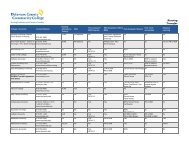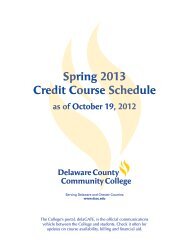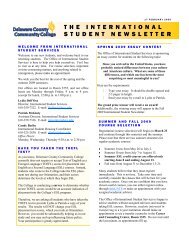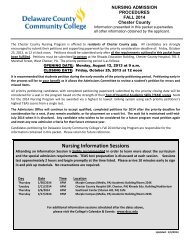2010 Catalog - Delaware County Community College
2010 Catalog - Delaware County Community College
2010 Catalog - Delaware County Community College
You also want an ePaper? Increase the reach of your titles
YUMPU automatically turns print PDFs into web optimized ePapers that Google loves.
154 COURSE DESCRIPTIONS<br />
• Understand the nature of organizational communications,<br />
including the factors that influence decision making.<br />
• Understand the nature of leadership and be able to list<br />
at least three leadership skills.<br />
• Explain "social environment" conformity.<br />
• Understand the power of rumor and how it might<br />
be controlled.<br />
• Explain the concept of industrial participation by<br />
employees including: (1) process, (2) prerequisites, (3)<br />
benefits, (4) types, and (5) limitations.<br />
• Be familiar with the social problems and ethical issues<br />
that cause stress and distress in the workplace.<br />
• Know the various responsibilities incumbent upon<br />
worker and employer regarding referral and treatment<br />
of social problems in industry.<br />
• Understand the nature of "change" in the workplace.<br />
Prereq. PSY 140<br />
3 Credits 3 Weekly Lecture Hours<br />
PSY 220<br />
Abnormal Psychology<br />
The nature of abnormal behavior, its etiology and classification<br />
together with a brief examination of treatment<br />
methods are emphasized. Psychoanalytic, behavioral,<br />
cognitive and sociocultural perspectives on psychopathology<br />
are examined within a biopsychosocial framework.<br />
Upon successful completion of this course, students<br />
should be able to:<br />
• Discuss, describe and compare ambiguities inherent<br />
in the definition of abnormal behavior.<br />
• Discuss, describe and compare various theoretical<br />
perspectives regarding the causation of<br />
psychopathology.<br />
• Identify, describe and compare the behaviors defining<br />
the general categories of abnormal behavior and the<br />
types within these categories.<br />
• List, define and differentiate among the principal<br />
medical, psychological and behavioral therapies used<br />
today, citing advantages and disadvantages.<br />
Prereq. PSY 140<br />
3 Credits 3 Weekly Lecture Hours<br />
PSY 221<br />
Social Psychology<br />
This course examines how the thoughts, feelings and<br />
behavior of an individual are influenced by the actual,<br />
imagined or implied presence of others with the goal of<br />
understanding social reality.<br />
Upon successful completion of this course, students<br />
should be able to:<br />
• Explain five major socio-psychological theories.<br />
• Delineate the major methods of studying human behavior.<br />
• Analyze and explain sex-role behavior.<br />
• Depict the impact of violence on the individual, the<br />
group and our society.<br />
• Assess the significance of attitudes on perception, moral<br />
judgment, prejudice and prosocial behavior.<br />
• Cite the components of the authoritarian personality<br />
and its threat to individual human freedom.<br />
• List the major advantages and disadvantages of<br />
persons and task-oriented leadership in groups<br />
and organizations.<br />
Prereq. PSY 140 or SOC 110<br />
3 Credits 3 Weekly Lecture Hours<br />
PSY 225<br />
Experiences in Diversity<br />
This course critically examines societal and personal<br />
attitudes, values and norms regarding diversity. Topics<br />
include: race, ethnicity, gender and sexual preference. We<br />
will examine how these factors influence our perception of<br />
self and others.<br />
Upon successful completion of the course, students<br />
should be able to: Demonstrate critical thinking on issues<br />
of race, gender, ethnicity and sexual orientation.<br />
• Describe the impact of minority and majority status as it<br />
pertains to economic, psychological and social experience.<br />
• Describe the etiology of racism, sexism, ethnocentrism<br />
and homophobia.<br />
• List some of the contradictions of our multicultural society<br />
and different strategies toward resolving them.<br />
• Evaluate the positive and negative dimensions of your own<br />
cultural experience. Identify personal values that promote<br />
understanding and cooperation among human beings.<br />
• Discuss how culture and gender shape our personal<br />
identities and behaviors<br />
Prereq. SOC 110 or PSY 140<br />
3 Credits 3 Weekly Lecture Hours<br />
PSY 235 Educational Psychology<br />
This course addresses psychological principles, cognitive<br />
development and learning theories applicable to students,<br />
the learning process and the classroom teacher. Focus areas<br />
include human growth and development, learning theory,<br />
motivation theory, instructional and school practices, individual<br />
differences, student interpersonal and group behavior,<br />
classroom management and organization, the teacher as<br />
an action researcher, and assessment of performance.<br />
Upon successful completion of this course, students<br />
should be able to:<br />
• Describe how educational psychology is used by teachers.<br />
• Differentiate the various theories applied to cognitive,<br />
language, psychosocial, emotional, and moral<br />
development of children and adolescents.<br />
• Understand developmentally appropriate teaching/learning<br />
practices and design lessons based on them.<br />
• Describe and adapt to the diversity of students in terms<br />
of special needs, personality, social-cultural, linguistic,<br />
intelligence and learning style characteristics.<br />
• Describe and apply behavioral and social learning<br />
approaches.<br />
• Describe and apply cognitive information-processing and<br />
constructivist learning approaches.<br />
• Apply various theories and practices related to student<br />
motivation.<br />
• Identify factors of classroom management and effective<br />
classroom climates.<br />
• Explain what is meant by group differences and<br />
individual differences and their implications for<br />
instruction and learning.<br />
• Describe various instructional design approaches.<br />
• Describe important topics related to classroom<br />
assessment (measurement and evaluation).<br />
• Explain the development, uses, and limitations of<br />
standardized tests in education.<br />
Prereq. PSY 140<br />
3 Credits 3 Weekly Lecture Hours<br />
PSY 241 Child Psychology<br />
This course is a cross-cultural examination of current<br />
research, theories and issues in the physical, cognitive,<br />
social and psychological development of children from<br />
prenatal development to adolescence.<br />
Upon successful completion of this course, students<br />
should be able to:<br />
• Identify the basic principles underlying development<br />
through childhood.<br />
• Identify the major physical and psychological<br />
characteristics of prenatal development, infancy,<br />
childhood and adolescence.<br />
• Evaluate the various theoretical approaches to<br />
cognitive, emotional, social and personality<br />
development through childhood.<br />
• Identify cross-cultural research findings and<br />
their relevance to the study of child development.<br />
Prereq. PSY 140<br />
3 Credits 3 Weekly Lecture Hours<br />
PSY 290<br />
Adulthood and Aging<br />
This course is an examination of the physical,<br />
psychological, cognitive, social and cultural changes that<br />
occur as people move from adulthood into old age. It<br />
explores the controversies, myths, realities, similarities<br />
and differences in growing older today in America as well<br />
as in other cultures around the world. Upon successful<br />
completion of this course, students should be able to:<br />
• Identify the basic principles underlying development<br />
from the adult years through the end of life.<br />
• Identify the major physical and psychological<br />
characteristics of adult development from adulthood<br />
to old age.<br />
• Evaluate the various theoretical approaches to cognitive,<br />
emotional, social and personality development in adult<br />
development through old age.<br />
• Evaluate the relevance of cross-cultural research<br />
findings in adult development and aging.<br />
Prereq. ENG 050 and REA 050<br />
3 Credits 3 Weekly Lecture Hours<br />
(RAD) Radiation Therapy<br />
RAD 100 Introduction to Radiation<br />
Therapy<br />
This is an introductory course designed to provide students<br />
with an overview of the fundamentals of radiation therapy<br />
and the radiation therapist's role in the health care delivery<br />
system. Principles, practices and policies of the educational<br />
program, health care systems, principles of radiation<br />
and health safety and professional responsibilities of the<br />
radiation therapist will be discussed and examined.<br />
Upon successful completion of this course, students<br />
should be able to:<br />
• Discuss the policies and procedures of the program and<br />
clinical education settings as well as identify the<br />
responsibilities of the radiation therapy student.<br />
• Define cancer management principles and key terms in<br />
radiation therapy and identify pertinent library/internet<br />
resources pertinent to radiation therapy.<br />
• Discuss the responsibility of patient, staff and facility<br />
confidentiality and identify contents/sections of<br />
patient's records.<br />
• Discuss and identify the relationship of other health<br />
science professions and health care providers that<br />
participate in the patient's total healthcare as well as<br />
the philosophy/mission of health care systems and<br />
educational programs.<br />
• Explain radiation and health safety procedures for<br />
radiation therapy, personnel and patients.<br />
• Differentiate and explain the difference between<br />
regulatory, educational, international, national,<br />
state and local organizations.<br />
• Discuss the radiation therapist Scope of Practice,<br />
Practice Standards and Code of Ethics, career<br />
advancement and opportunities for radiation<br />
therapists and benefits for continuing education.<br />
Prerequisite: Program Acceptance<br />
2 Credits 2 Weekly Lecture Hours<br />
RAD 105<br />
Clinical Education I<br />
Clinical Education I is the first part of four clinical<br />
educational experiences for radiation therapy students.<br />
Clinical education incorporates the classroom components<br />
into an applied format.<br />
Upon successful completion of this course, students<br />
should be able to:<br />
• Practice appropriate patient care and communication at<br />
all times and maintain patient modesty.<br />
• With assistance, operate all modes and functions of the<br />
treatment machine and console and accurately set up<br />
patients with the proper parameters.<br />
DELAWARE COUNTY COMMUNITY COLLEGE

















